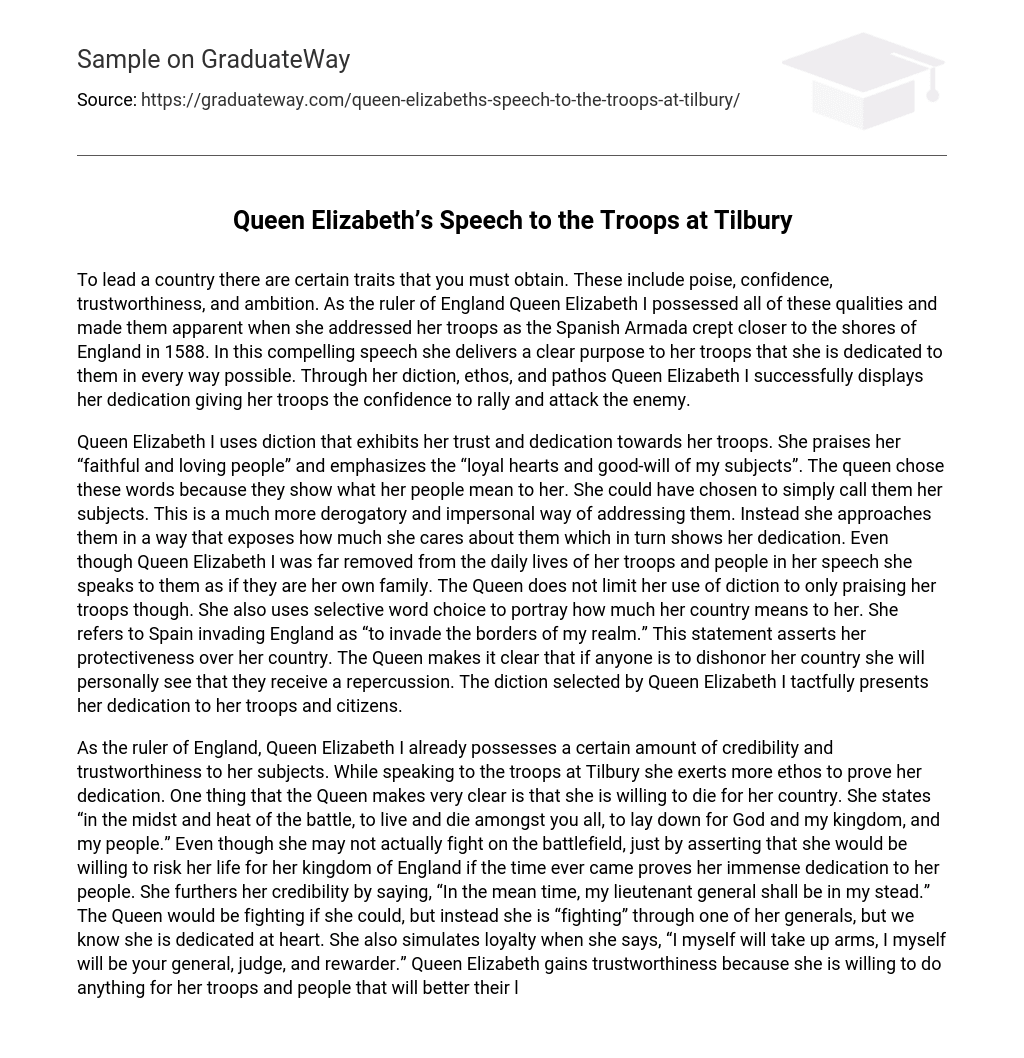To lead a country there are certain traits that you must obtain. These include poise, confidence, trustworthiness, and ambition. As the ruler of England Queen Elizabeth I possessed all of these qualities and made them apparent when she addressed her troops as the Spanish Armada crept closer to the shores of England in 1588. In this compelling speech she delivers a clear purpose to her troops that she is dedicated to them in every way possible. Through her diction, ethos, and pathos Queen Elizabeth I successfully displays her dedication giving her troops the confidence to rally and attack the enemy.
Queen Elizabeth I uses diction that exhibits her trust and dedication towards her troops. She praises her “faithful and loving people” and emphasizes the “loyal hearts and good-will of my subjects”. The queen chose these words because they show what her people mean to her. She could have chosen to simply call them her subjects. This is a much more derogatory and impersonal way of addressing them. Instead she approaches them in a way that exposes how much she cares about them which in turn shows her dedication. Even though Queen Elizabeth I was far removed from the daily lives of her troops and people in her speech she speaks to them as if they are her own family. The Queen does not limit her use of diction to only praising her troops though. She also uses selective word choice to portray how much her country means to her. She refers to Spain invading England as “to invade the borders of my realm.” This statement asserts her protectiveness over her country. The Queen makes it clear that if anyone is to dishonor her country she will personally see that they receive a repercussion. The diction selected by Queen Elizabeth I tactfully presents her dedication to her troops and citizens.
As the ruler of England, Queen Elizabeth I already possesses a certain amount of credibility and trustworthiness to her subjects. While speaking to the troops at Tilbury she exerts more ethos to prove her dedication. One thing that the Queen makes very clear is that she is willing to die for her country. She states “in the midst and heat of the battle, to live and die amongst you all, to lay down for God and my kingdom, and my people.” Even though she may not actually fight on the battlefield, just by asserting that she would be willing to risk her life for her kingdom of England if the time ever came proves her immense dedication to her people. She furthers her credibility by saying, “In the mean time, my lieutenant general shall be in my stead.” The Queen would be fighting if she could, but instead she is “fighting” through one of her generals, but we know she is dedicated at heart. She also simulates loyalty when she says, “I myself will take up arms, I myself will be your general, judge, and rewarder.” Queen Elizabeth gains trustworthiness because she is willing to do anything for her troops and people that will better their lives. The ethos that is professed advances the Queens dedication.
When addressing troops that are about to enter into a life-threatening battle, as a speaker you need to calm their nerves, while also showing that you trust them. Queen Elizabeth successfully uses pathos to accomplish this task. The Queen renders, “we shall shortly have a famous victory over those enemies of my God, of my kingdom and of my people.” This statement demonstrates her confidence in the troops. Then, the troops realizing that their queen has so much faith towards them will possess the strength and courage to succeed in battle.





